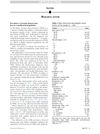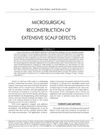 58 citations,
September 2012 in “Dermatologic Clinics”
58 citations,
September 2012 in “Dermatologic Clinics” Male pattern hair loss caused by follicular miniaturization; early diagnosis and treatment can reduce psychological burden.
 1 citations,
November 2014 in “British journal of medicine and medical research”
1 citations,
November 2014 in “British journal of medicine and medical research” PCOS and related metabolic issues often run in families.
 17 citations,
January 2013 in “Our Dermatology Online”
17 citations,
January 2013 in “Our Dermatology Online” Dutasteride mesotherapy helps treat male hair loss but may harm sperm and sexual function.
 92 citations,
June 2010 in “Journal of The American Academy of Dermatology”
92 citations,
June 2010 in “Journal of The American Academy of Dermatology” Dutasteride 0.5 mg daily improves hair growth safely in men with hair loss.
 38 citations,
December 2011 in “Journal of Dermatology”
38 citations,
December 2011 in “Journal of Dermatology” Use minoxidil for hair loss treatment, and finasteride for men.
 8 citations,
September 2010 in “Journal of Men's Health”
8 citations,
September 2010 in “Journal of Men's Health” Androgenic Alopecia, a common hair loss condition, can be effectively treated with finasteride and other treatments.
 14 citations,
April 2006 in “Expert Review of Dermatology”
14 citations,
April 2006 in “Expert Review of Dermatology” Antiandrogen therapy helps treat genetic hair loss.
 24 citations,
June 2011 in “International Journal of Dermatology”
24 citations,
June 2011 in “International Journal of Dermatology” Most pregnant women experience skin changes like darkening and itching, while serious skin conditions are rare but need early treatment.
 95 citations,
November 2016 in “Journal of The American Academy of Dermatology”
95 citations,
November 2016 in “Journal of The American Academy of Dermatology” Treatments for permanent hair loss from scarring aim to stop further loss, not regrow hair, and vary by condition, with partial success common.
 January 2019 in “Journal of Dermatology and Venereology”
January 2019 in “Journal of Dermatology and Venereology” Sesame and pumpkin seed oil can effectively regrow hair in alopecia areata.
 2 citations,
April 2021 in “Journal of The American Academy of Dermatology”
2 citations,
April 2021 in “Journal of The American Academy of Dermatology” Female pattern hair loss affects 32.3% of women, increasing with age and showing no racial differences.
 25 citations,
December 2015 in “Journal of the European Academy of Dermatology and Venereology”
25 citations,
December 2015 in “Journal of the European Academy of Dermatology and Venereology” Alopecia areata significantly lowers quality of life, especially in personal and social areas, and more so if the patient is also depressed.
 24 citations,
April 2017 in “Journal of Investigative Dermatology”
24 citations,
April 2017 in “Journal of Investigative Dermatology” Age, smoking, and lower BMI increase facial wrinkles; men wrinkle more than women, except in old age; pale skin and certain hormonal factors can protect against wrinkles.

Alopecia Areata has no cure, treatments are limited, and the condition often recurs, but new therapies like JAK inhibitors show promise.
 33 citations,
August 2016 in “Indian Journal of Dermatology, Venereology and Leprology”
33 citations,
August 2016 in “Indian Journal of Dermatology, Venereology and Leprology” Dutasteride is more effective than finasteride at increasing hair count and reversing hair thinning in men with hair loss, but both have similar side effects.
 178 citations,
April 2017 in “Journal of The American Academy of Dermatology”
178 citations,
April 2017 in “Journal of The American Academy of Dermatology” Minoxidil, finasteride, and low-level laser light therapy effectively treat hair loss.
 15 citations,
January 2018 in “Acta dermato-venereologica”
15 citations,
January 2018 in “Acta dermato-venereologica” Finasteride and dutasteride increase sexual dysfunction risk by 1.57 times in male hair loss treatment.
 9 citations,
February 2005 in “The Journal of Men's Health & Gender”
9 citations,
February 2005 in “The Journal of Men's Health & Gender” Finasteride effectively treats male hair loss, increasing length and thickness.
 3 citations,
May 2013 in “Journal of the American Association of Nurse Practitioners”
3 citations,
May 2013 in “Journal of the American Association of Nurse Practitioners” Use minoxidil or finasteride first, then try HairMax LaserComb if needed.
 3 citations,
January 2021 in “Postepy Dermatologii I Alergologii”
3 citations,
January 2021 in “Postepy Dermatologii I Alergologii” Yes, smoking damages your skin.
 17 citations,
May 2013 in “Oral and Maxillofacial Surgery Clinics of North America”
17 citations,
May 2013 in “Oral and Maxillofacial Surgery Clinics of North America” The document concludes that careful surgical methods and choosing the right materials are key for successful scalp, skull, and frontal sinus reconstruction.
 March 2017 in “InTech eBooks”
March 2017 in “InTech eBooks” Acne vulgaris is a common skin condition that can cause low self-esteem and depression, and early treatment is important to prevent scarring.

Some vaccines, like the hepatitis B vaccine, might be linked to the hair loss condition Alopecia Areata, but more research is needed.
 38 citations,
February 2016 in “Surgery Journal”
38 citations,
February 2016 in “Surgery Journal” Facial plastic surgery has evolved to focus on less invasive techniques and innovative technologies for cosmetic and reconstructive procedures.
 14 citations,
July 2009 in “Current Opinion in Otolaryngology & Head and Neck Surgery”
14 citations,
July 2009 in “Current Opinion in Otolaryngology & Head and Neck Surgery” Hair restoration techniques like follicular unit transplant surgery and follicular unit extraction are effective, with ideal graft placement density between 20-30 units per cm². Medications like Minoxidil and Finasteride can help maintain and regrow hair.
 23 citations,
October 2005 in “Dermatologic Surgery”
23 citations,
October 2005 in “Dermatologic Surgery” Finasteride improves surrounding scalp hair and increases hair density after hair transplant.
 50 citations,
May 1999 in “Journal of Reconstructive Microsurgery”
50 citations,
May 1999 in “Journal of Reconstructive Microsurgery” Microsurgical reconstruction effectively covers complex scalp defects but doesn't improve survival for cancer-related cases.
 November 2009 in “Cambridge University Press eBooks”
November 2009 in “Cambridge University Press eBooks” Minoxidil and finasteride combined can effectively treat hair loss.
September 2022 in “Dermatology and therapy” Androgenetic alopecia is linked to heart disease, metabolic issues, and mental health problems.
 1 citations,
January 2009 in “CRC Press eBooks”
1 citations,
January 2009 in “CRC Press eBooks” Finasteride increases hair count and improves hair growth with low risk of side effects.





























